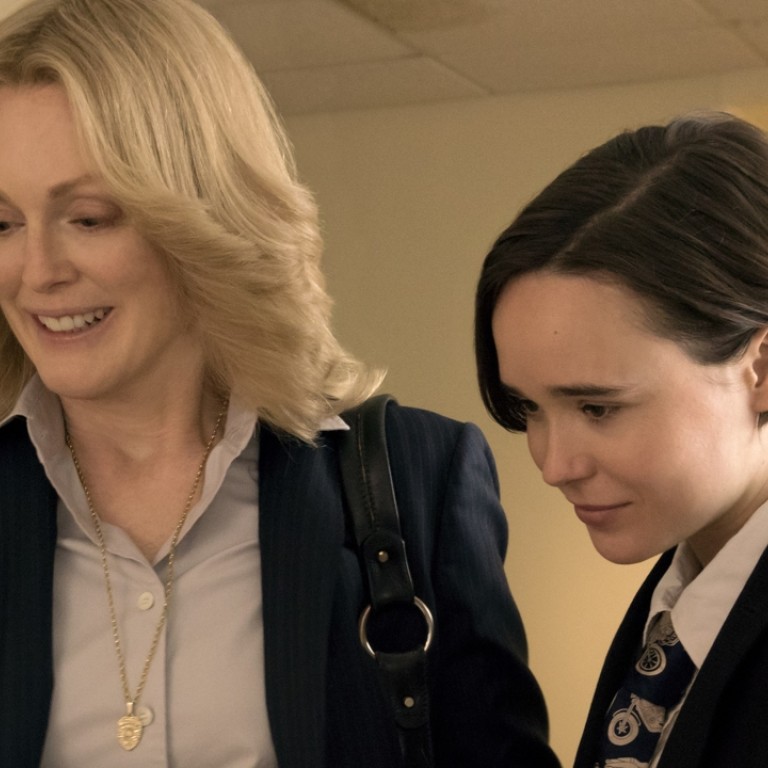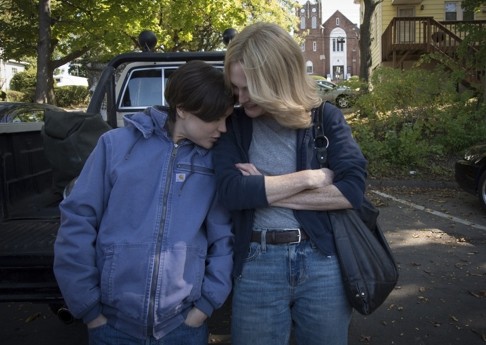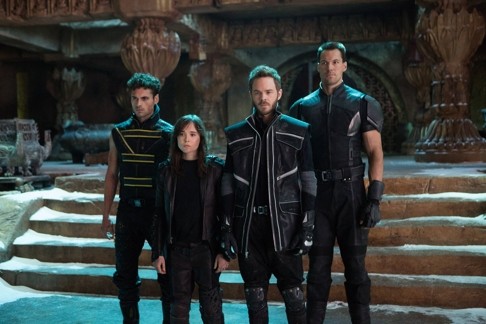
After coming out, Ellen Page walks taller and breathes more freely
Liberation and creative expression were two of the happy consequences when the Freeheld star decided to tell the world she was gay
Ellen Page has recently become acutely aware of how she carries her body. In the year and a half since she publicly came out as a lesbian, her posture has morphed. There’s less hunching over now, less looking at the ground.
“People close to me keep remarking on how different I am now,” the 28-year-old says. “And honestly, my body was different. I think I had just become really closed off. It’s a feeling that existed within me. Shame, I think. The word would be ‘shame’.”
Letting go of that feeling has proved transformative for the actress, who rose to fame in 2007 as a fast-talking pregnant teenager in Juno. She does not feel the need to hide who she is dating any more; two months ago she walked down a red carpet with her girlfriend of nine months, visual artist Samantha Thomas. And for the first time she’s playing a gay character in a movie.

Coming out has clearly liberated Page, but she is cautious when talking about LGBT issues, choosing her words carefully so as not to offend. She repeatedly emphasises how privileged she is and lists statistics about homeless LGBT youth and the low life expectancy for transgender black women. She downplays any hatred spewed her way – sometimes literally – explaining that it’s relatively insignificant in comparison to the positive feedback she gets.
On Twitter, for instance, she is regularly told that she is “going to go to hell” or she should “just find a man”.

She had a stark reminder recently while walking in New York City’s East Village with her arm around her girlfriend. A man spat on the couple, she says, imitating how he aggressively hocked a loogie in their direction.
“He was so loud,” she says. “Like, so loud I can’t explain it. It was actually really scary.”
Even so, she stresses, she wishes she’d come out years ago.
“I look back now, and I’m like, ‘What was I so afraid of?’ But I was really scared. And what a ridiculous thing to be feeling. It got to a place where it actually felt wrong. It was unequivocally not only the right thing to do – but the thing to do. To be out. So I could live my life and be happy and be in relationships and be happy. And I couldn’t be happier. I could not be happier. I don’t know why I waited so long.”

This long-time vocal activist on the environment was silent on LGBT issues. She can recall wanting to tweet about gay rights and feeling too anxious, fearful that fans would subsequently ask if she was gay. Every documentary she watched about oppressed individuals – God Loves Uganda, Pussy Riot: A Punk Prayer – made her feel guilty about hiding her identity.
“It was like, ‘Dude, come on. What are you doing? What are you afraid of? Look what true, brave, courageous people do in the world. Just tell people you’re gay! What the heck?’” she recalls.
“I think a big part of why I wanted to come out was I did feel guilt. I felt guilt about not being a visible person for the LGBT community and feeling actually quite disconnected from the LGBT community and not wanting to feel that way any more. Not wanting to feel how I felt, which was sad.”
So on Valentine’s Day in 2014, she gave an impassioned speech at a Human Rights Campaign conference, in which she came out. The YouTube video of the talk quickly went viral and has since amassed more than 5 million views. While there are a handful of middle-aged out lesbian actresses – Jane Lynch, Portia de Rossi and Cynthia Nixon among them – Page suddenly became one of the few well-known lesbian stars who was also a millennial.

“There are so many straight love stories sent to young actresses in Hollywood,” notes Page’s Freeheld co-star Moore, who has become a close friend. “All these years, she’s pretending to be in love with men in movies. To be able to play your own sexuality when you never have before? It made her feel grounded. She felt celebratory.”
Page shared her contentment often with her Freeheld collaborators, telling director Peter Sollett after the first week of filming that she had never felt so fulfilled on a set. He said it was as if he were discovering a new talent at an open casting call.
“It was amazing how her physicality changed, and part of that was feeling less guarded psychologically,” says the filmmaker. “But she was also wearing the clothes of a mechanic character, and she was so much more at home in that costume. She’s been wearing these beautiful suits on the red carpet and dressing in a more masculine way, so that clothing was familiar and comfortable to her. It freed her up.”

She continues: “If you’re unwell and sad, if you’re not feeling inspired creatively, that shows. I wasn’t feeling the love or excitement I used to feel about my job. And now I do feel that way.”
Casting based on sexual orientation is a topic that makes her visibly anxious to discuss. She says she understood, for example, why some in the transgender community are upset that straight actor Eddie Redmayne was cast in a transgender role inThe Danish Girl.
“I think it’s hard in the sense that Eddie Redmayne is a superb actor,” she says. “But it’s tricky, because I totally understand that there’s so little opportunity for trans people, and they’re trying to say, ‘Hey, we need to be represented’. But I personally am excited to go see Eddie Redmayne in that role. I’m excited to see [straight actresses] Rooney Mara and Cate Blanchett in [the lesbian love story] Carol. I love Blue Is the Warmest Colour, and as far I know they’re not gay.
“I want to tell LGBT stories because I’m gay. I want to play a gay person. But I would never read something and be like, ‘Oh, she’s straight. I don’t want to play that’.”
Los Angeles Times
Freeheld opens on December 10.
